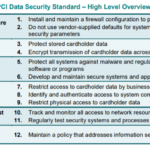As a business professional, your fundamental understanding of the Payment Card Industry Data Security Standard’s (PCI-DSS) requirements and maintaining compliance is pivotal. This article, “Understanding the Impact of Operational Changes on PCI-DSS Compliance,” provides critical insight into the way alterations in your business operations could potentially affect your compliance with this standard. Woody elaboration on the effects of these operational changes – both intentional and unforeseen – and robust strategies to maintain PCI-DSS compliance in a dynamic business landscape, helping you to safeguard customer information and uphold the integrity of your business operations.
Understanding PCI-DSS
Payment Card Industry Data Security Standard (PCI-DSS) is a complex but essential subject that your business must understand to protect itself and its customers. In today’s digital world where card payments dominate the market, the security of cardholder data has become crucially significant.
Basics of Payment Card Industry Data Security Standard (PCI-DSS)
PCI-DSS is a universally recognized set of requirements designed to ensure that every business that collects, processes, stores, or transmits credit card information maintains a secure environment. This international security standard was established by the Payment Card Industry Security Standards Council (PCI SSC) to prevent card fraud and protect cardholder data.
Importance of PCI-DSS in safeguarding cardholder data
Your commitment to safeguarding cardholder data requires active PCI-DSS compliance. This compliance not only ensures data security, but it also builds trust among clients and customers. Furthermore, it protects your business from the potentially devastating effects of data breaches such as fines, penalties, and loss of business reputation.
Key requirements for PCI-DSS compliance
Achieving and maintaining PCI-DSS compliance requires the fulfillment of twelve key requirements. These requirements reflect a thorough approach to data security, covering steps for building and maintaining a secure network, protecting cardholder data, maintaining a vulnerability management program, implementing strong access control measures, monitoring and testing networks regularly, and maintaining an information security policy.
Operational Changes in Businesses
Understanding operational changes is a fundamental aspect that could affect your business-either positively or negatively.
Brief overview of operational changes in businesses
Operational changes refer to the varied adjustments that may occur in your business’s structure, practices, procedures, or processes. These changes can be brought about by various factors, and it’s important that they are planned, managed, and implemented effectively to minimize disruption and maximize benefits.
Potential triggers for operational changes
Several factors can ignite operational changes, such as technological advancements, changes in market conditions, regulatory changes, expansions, mergers, or acquisitions. These factors necessitate changes to remain competitive and compliant in the continually evolving business environment.
Impact of operational changes on business processes and policies
Operational changes can profoundly impact your business’s processes and policies. They may require alterations or developments in technology, workflows, job roles, skills, policies, and procedures. It’s crucial for these changes to be managed systematically to ensure that they support the business’s strategic objectives.
Examples of operational changes in different industries
Across different sectors, businesses undergo operational changes. For instance, in the retail industry, a shift towards e-commerce due to increased online shopping can trigger changes in payment processing systems. Financial institutions may experience changes related to mergers or acquisitions, driving changes in data storage protocols.
Impact of Operational Changes on PCI-DSS Compliance
Operational changes can directly affect your compliance with PCI-DSS, especially where cardholder data is concerned.
Direct impact of operational changes on PCI-DSS compliance
Operational changes often require adjustments in the way your business handles card payment data. As a result, these changes may affect the security controls you have in place, potentially compromising your PCI-DSS compliance status.
Situation analysis: changes in payment processing systems
Should your business decide to upgrade its payment processing system or shift to an online platform, this inherently affects how cardholder data is processed. Consequently, these changes can impact the requirements for PCI-DSS compliance and potentially introduce new vulnerabilities.
Situation analysis: changes in data storage protocols
If operational changes involve modifications to your data storage protocols, these too can impact PCI-DSS compliance. Whether it’s moving to new databases, incorporating cloud storage solutions, or changing data retention policies, these changes could alter the safeguards protecting cardholder data.
Mitigating the Risks of Operational Changes
Understanding and managing the risks associated with operational changes is essential to ensuring your business remains PCI-DSS compliant.
Risk assessment for operational changes
The successful navigation of operational changes requires accurate risk assessments. Recognize and analyze potential risks related to data security and PCI-DSS compliance in the planning stages of any operational change.
Best practices for implementing operational changes
Smooth operational changes require best practices such as detailed planning, proactive risk management, clear communication, staff training, and thorough testing of new systems, procedures, and policies before going live.
Tools and strategies for risk mitigation
Leverage various tools and strategies when undertaking changes. Data mapping tools can help identify points of vulnerability in handling cardholder data. Incident response plans prepare for potential breaches, while encryption and tokenization can facilitate secure data storage and transfer.
Maintaining PCI-DSS Compliance during Operational Changes
Ensuring PCI-DSS compliance during operational changes is crucial in continuing to protect cardholder data and maintain customer trust.
The role of PCI-DSS audits during changes
Regular PCI-DSS audits should accompany any changes. Audits will review new systems, processes, and procedures, evaluating them against the PCI-DSS requirements and identify possible compliance risks.
Maintaining data security during operational changes
Maintaining data security during operational changes is a priority. Your business must ensure that it follows PCI-DSS requirements at every stage of change implementation, from the planning phase through to post-implementation review.
Continuous monitoring and evaluation
Continuous monitoring and evaluation of your business operations are equally crucial during this transition period. Regular checks will help to identify and address any potential vulnerabilities before it escalates into a more serious problem.
Case Studies: Businesses and PCI-DSS Compliance during Operational Changes
Looking at case studies provides valuable insights into dealing with PCI-DSS compliance during operational changes.
Case study: Changes in payment systems
One business migrated from a traditional point-of-sale system to a cloud-based processing system. To ensure PCI-DSS compliance, an external Qualified Security Assessor conducted a pre-deployment audit, and PCI-specific training was made mandatory for all staff.
Case study: Mergers or acquisitions
Another example is a financial institution that underwent a merger. The merger led to changes in data storage protocols, prompting a complete review of the organization’s PCI-DSS compliance strategy and a reassessment of their PCI-DSS scope due to new data flows.
Common themes and lessons learned
From these case studies, a common theme emerges – the importance of involving PCI-DSS experts, conducting regular audits, and ensuring staff are well conversed with PCI-DSS requirements.
Ongoing Compliance: Beyond the Operational Change
Compliance is not a one-time task, but a continuous process that must adapt to your business’s evolution.
Periodic PCI-DSS assessments and audits
Regular PCI-DSS assessments and audits are necessary to ensure continuing compliance. It is crucial they are conducted post-operational changes to verify that the changes have not introduced new security risks.
Maintaining ongoing compliance through policy and procedures updates
Operational changes often require businesses to update their policies and procedures. Your business should ensure that these revisions effectively address PCI-DSS requirements and are communicated to all relevant personnel.
Compliance as a continuous effort
Compliance should be viewed as an enduring effort that requires a long-term commitment, regular reviews, updates, and staff education. Continuous compliance will help your business maintain a strong defense against data breaches and cardholder data theft.
Implications for Stakeholders
Operational changes and PCI-DSS compliance influence various stakeholders, especially customers, employees, and businesses themselves.
Impact on customers and cardholders
Changes that affect PCI-DSS compliance can affect customers, as their trust is intrinsically tied to how securely their cardholder data is managed. Businesses maintaining PCI-DSS compliance demonstrate their commitment to protecting customer data, boosting customer trust and loyalty.
Impact on employees and management
Operational changes can affect employees and management by requiring new skills or understanding of new procedures. Training and support can help staff adapt and ensure PCI-DSS compliance is maintained.
Impact on business reputation and credibility
For businesses, maintaining PCI-DSS compliance during operational changes can bolster their reputation, demonstrating their commitment to security to clients and partners.
Future Perspectives: Operational Changes and PCI-DSS Compliance
Future operational changes and PCI-DSS compliance will be influenced by evolving threats and advancements in payment technologies.
Evolution of PCI-DSS in response to changing business environments
As business environments continue to evolve, spurred by digital transformation and changing economic landscapes, PCI-DSS must adapt to ensure it continues to effectively safeguard cardholder data.
Predicted trends for operational changes
With rapid advances in technology and increasing customer expectations, businesses can anticipate a need for further operational changes, such as embracing new payment technologies or implementing more advanced data protection measures.
Possible challenges and opportunities
While such changes may bring challenges in maintaining PCI-DSS compliance, they also present opportunities for businesses to strengthen their data security posture, build customer trust, and gain a competitive advantage through their commitment to industrial standards.
Conclusion: Navigating Operational Changes and PCI-DSS Compliance
Understanding the impact of operational changes on PCI-DSS Compliance is crucial to ensure that your business continues to protect cardholder data through all its endeavors.
Summary of main discussion points
We have explored the basics of PCI-DSS, the potential impact of operational changes on compliance, the importance of risk assessments, and ways to maintain compliance. We’ve touched on the implications for various stakeholders and future perspectives on operational changes and PCI-DSS compliance.
Final thoughts on managing operational changes while maintaining PCI-DSS compliance
Managing operational changes while maintaining PCI-DSS compliance may present challenges, but with diligence, planning, and a focus on continuous compliance, these can be navigated successfully.
Recommendations for businesses undergoing operational changes
Ensure thorough risk assessments prior to changes, implement a sound security system, conduct regular audits, train staff, embrace ongoing compliance, and consider the customer’s perspective. These steps are essential in navigating operational changes while maintaining PCI-DSS compliance.
In conclusion, operational change is a certainty in business. Proper management of these changes while maintaining PCI-DSS Compliance is necessary to secure the trust of customers, maintain credibility, and uphold business reputation.










